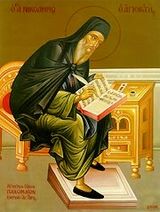Difference between revisions of "Nicodemus of the Holy Mountain"
m (added link to Metropolis of Paranaxos) |
|||
| Line 1: | Line 1: | ||
[[Image:StNicodemusOfTheHolyMountain.jpg|160px|thumb|right|Icon of St. Nicodemus of the Holy Mountain]]Our venerable and God-bearing Father '''Nicodemus of the Holy Mountain''' (or Nikodemos the Hagiorite) was a great theologian and teacher of the [[Orthodox Church]], reviver of [[hesychasm]], [[Canon Law|canonist]], [[Hagiography|hagiologist]], and writer of liturgical poetry. | [[Image:StNicodemusOfTheHolyMountain.jpg|160px|thumb|right|Icon of St. Nicodemus of the Holy Mountain]]Our venerable and God-bearing Father '''Nicodemus of the Holy Mountain''' (or Nikodemos the Hagiorite) was a great theologian and teacher of the [[Orthodox Church]], reviver of [[hesychasm]], [[Canon Law|canonist]], [[Hagiography|hagiologist]], and writer of liturgical poetry. | ||
| − | St. Nicodemus was born c. 1749 in Naxos, Greece. In 1775 he became a [[monk]] at [[Mount Athos]]. He worked with [[Saint]] Macarius Notaras of Corinth to compile the [[Philokalia]], a defining work on [[monastic]] spirituality. He edited and reworked two books on Western spirituality which had already been translated into Greek and wrote many original works including ''Lives of the Saints''. | + | St. Nicodemus was born c. 1749 in [[Metropolis of Paranaxos|Naxos, Greece]]. In 1775 he became a [[monk]] at [[Mount Athos]]. He worked with [[Saint]] Macarius Notaras of Corinth to compile the [[Philokalia]], a defining work on [[monastic]] spirituality. He edited and reworked two books on Western spirituality which had already been translated into Greek and wrote many original works including ''Lives of the Saints''. |
St. Nicodemus reposed in the Lord in 1809 and was [[glorification|glorified]] by the Orthodox Church in 1955. His [[feast day]] is celebrated on [[July 14]]. | St. Nicodemus reposed in the Lord in 1809 and was [[glorification|glorified]] by the Orthodox Church in 1955. His [[feast day]] is celebrated on [[July 14]]. | ||
| Line 10: | Line 10: | ||
==See also== | ==See also== | ||
| − | * [[Canon law]] | + | *[[Canon law]] |
| − | * [[The Rudder]] | + | *[[The Rudder]] |
==External link== | ==External link== | ||
| Line 18: | Line 18: | ||
[[Category:Monastics]] | [[Category:Monastics]] | ||
[[Category:Saints]] | [[Category:Saints]] | ||
| + | [[Category:Greek Saints]] | ||
[[Category:Canon Law]] | [[Category:Canon Law]] | ||
[[el:Άγιος Νικόδημος ο Αγιορείτης]] | [[el:Άγιος Νικόδημος ο Αγιορείτης]] | ||
[[ro:Nicodim Aghioritul]] | [[ro:Nicodim Aghioritul]] | ||
Revision as of 05:43, February 26, 2008
Our venerable and God-bearing Father Nicodemus of the Holy Mountain (or Nikodemos the Hagiorite) was a great theologian and teacher of the Orthodox Church, reviver of hesychasm, canonist, hagiologist, and writer of liturgical poetry.
St. Nicodemus was born c. 1749 in Naxos, Greece. In 1775 he became a monk at Mount Athos. He worked with Saint Macarius Notaras of Corinth to compile the Philokalia, a defining work on monastic spirituality. He edited and reworked two books on Western spirituality which had already been translated into Greek and wrote many original works including Lives of the Saints.
St. Nicodemus reposed in the Lord in 1809 and was glorified by the Orthodox Church in 1955. His feast day is celebrated on July 14.
Sources
- Nicodemus of the Holy Mountain (Roman Catholic)
- Modern Orthodox Saints (Vol. 3) by Constantine Cavarnos. Published by the Institute for Byzantine & Modern Greek Studies, 1994 (ISBN 0914744410)
See also
External link
Categories > Church History
Categories > Church History
Categories > Church History
Categories > Church History > Canon Law
Categories > Liturgics > Feasts
Categories > Liturgics > Feasts
Categories > Liturgics > Feasts
Categories > People > Monastics
Categories > People > Monastics > Athonite Fathers
Categories > People > Saints
Categories > People > Saints > Greek Saints
Categories > People > Saints > Saints by century > 19th-century saints
Categories > Spirituality > Asceticism
